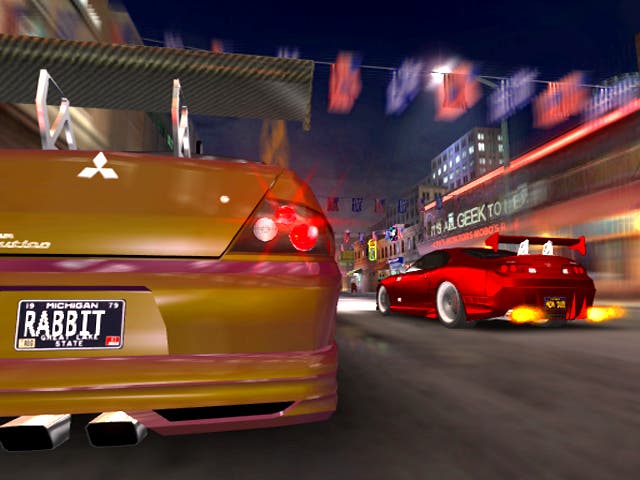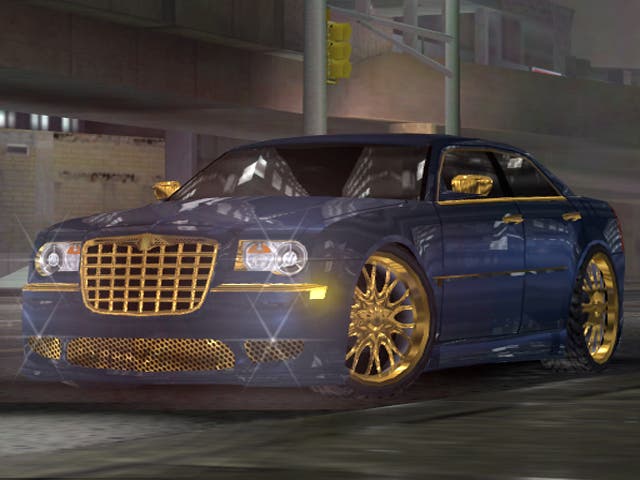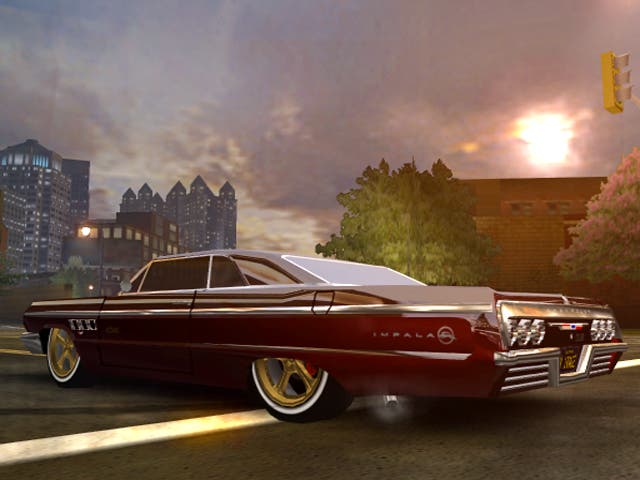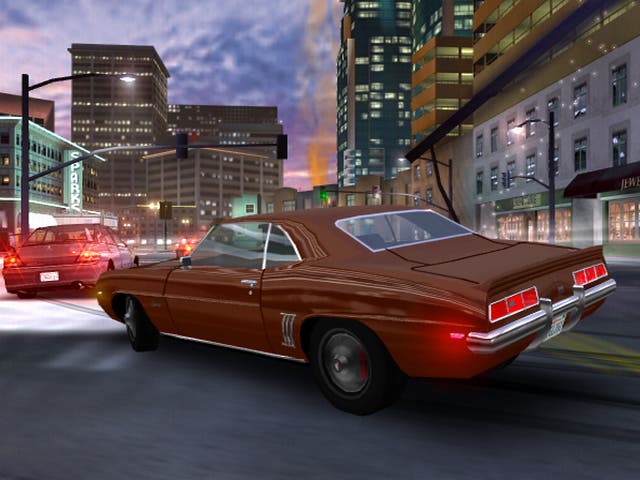Midnight Club 3: DUB Edition
We thought it might have some heavy Reggae in it, but we were wrong. Shame.
Order yours now from Simply Games.
Rockstar must have been carrying around a massive guilt complex after the release of Midnight Club II. You don't go from making possibly the biggest ballbuster the arcade racing genre has ever seen to one of the most forgiving without indulging in some serious hand-wringing behind the scenes. Whereas Midnight Club II positively delighted in your failure, the third in the street racing series is so easy you can almost hear the game apologise every time an AI controlled car overtakes you. "I'm terribly sorry, after you sir, I appear to be in the lead..."
Okay, that's a gross exaggeration, but winning is a formality in all bar a handful of the fifty-odd career races you'll face in MC3, and, not only that, you can easily triumph over vastly superior opposition in all but the last handful of races with the very first car you buy (in my case, a D Class R32 Golf). Clearly something went awry with the progression system and difficulty-balancing in planet Rockstar. While MC2 suffered from almost vertical difficulty spikes and cheating elastic AI, MC3 grossly overcompensates for that. It's no exaggeration to report that MC3 sets a new low benchmark for ease and accessibility for racing games, and while that might be a good ploy for making racing newbies feel good about their prowess, it leaves long term fans such as us and those with a modicum of experience in arcade racing feeling very underwhelmed indeed, and almost longing for the ballbusting sense of challenge and satisfaction gleaned from the flawed gem that its predecessor was.
Don't forget the motor city

As previously, Midnight Club is all about non-linear night-time city street-racing. Once again it's set across three cities (in this case San Diego, Atlanta and Detroit), and the game's central differentiator is that it's not based on a series of tracks. Instead it lays down checkpoints, giving you the ability to effectively choose your own route in each race, darting down cluttered alleyway shortcuts one minute, blazing a trail through the middle of a shopping mall the next. It's excitingly unpredictable, with the AI never taking the same route from one race to the next, making it a unique racing experience that is as much based on your intimate knowledge of each city itself as each twist and turn of the race.
While previous Midnight Clubs have been largely based around racing against a series of cocky characters, winning their rides and moving onto the next, the latest MC fleshes out the idea to include various non-essential side tournaments such as City Races, Club Races - races which basically earn you cash and better vehicles. As such, there are now many more vehicles to choose from, but the basic career progression remains if you wish to plough that particular furrow.
Indeed, in a quest to see all three cities as quickly as possible and unlock all four car classes (D, right the way up to A) we spent the majority of our time facing off against the game's 17 street racers in a three or four part race series, earning prize money, speccing up our ride and moving onto the next. Having sweated blood doing this in the previous game, it was genuinely surprising to find just how relatively straightforward beating the game was this time - and all this with a car that wasn't fit to kiss the tyres of the kinds of vehicles we were racing against.
Racing for the hapless

The handling this time felt that much more forgiving, the cities less claustrophobic, the roads and alleys that much wider and more accommodating, the AI more forgiving. Every way you look at it, the game appears designed to give you less of a challenge, and is less interesting as a result. On numerous races we wiped out, crashed headlong into a building, took innumerable wrong turns, but almost always managed to make up the lost ground and blast past the AI near the finishing line and snatch victory from the jaws of defeat on our first or second attempt. Now, as a result, very few races were that memorable, and that's a stark contrast to the previous effort, where particular races are still etched into our brains two years on because they required such a degree of mental concentration and skill in order to win. Frustrating, yes, but satisfying as hell.
Another key change to MC2's winning formula is its special moves system. While all of the main moves such as Drift, In Air Control, Nitrous Boost, Slipstream Turbo and Weight Transfer (for motorbikes) have been retained, a bunch of new ones have entered the mix - but only for cars of a certain class. The newly implemented Agro move lets you plough through the competition as if they weren't there but is only available to SUVs, Trucks and Luxury Sedans. The new Roar, meanwhile, sends out an engine rev so loud traffic scatters out of your way - but in this case is only available to Muscle cars and Choppers (bikes). It's a tricky one to call, but it's slightly annoying that both these moves are only available to otherwise underpowered vehicles. It's tricky in the sense that you can appreciate that these new moves help balance up these vehicle classes' relative weaknesses, but at the same time there's a very good chance you'll never actually bother to buy these vehicles as it's arguably easier to win races using vehicles with higher general stats - i.e. the Tuner cars.
Another point worth mentioning regarding the special moves is the fact that it's now ridiculously easy to gain a Slipstream Turbo, meaning you barely have to position your car behind a rival for more than a couple of seconds before your boost is fully charged. Previously it was something you had to work hard to gain, but in MC3 everyone seems to be boosting like crazy, to the point where you start to wonder what the point is.
Nip and tuck

There are admittedly plenty of improvements to the latest Midnight Club, however, but on reflection many of them are cosmetic. The most obvious is in the visual department, with a massive overhaul in the game engine finally dragging the series up to the sort of acceptable standard we've been campaigning for all along. Even with the basic D class cars the sense of speed is quite ridiculous - almost up to Burnout levels of insanity. At this point everything works incredibly well, with the amount of on-screen debris, in-your-face sparking carnage and chaotic neon blur proving to be quite a rush. If you're groping for comparisons, think Burnout 2 in the dark; it's no less exciting, slightly less challenging, but with the same floppy handling, total disregard for realism, and - dare we say it - need for speed. Next to its most obvious nocturnal street racing rival, though, it's far more thrilling, less patronising, handles better and worthy of far more attention from the real petrol heads looking for a cheap thrill.
The audio's been improved a notch too, with an occasionally pleasing soundtrack that won't be to everyone's taste, but deserves praise for a) being a massive improvement on anything EA's managed lately, and b) dropping in some Queens Of The Stone Age, Iggy Pop, Idlewild, and Ash to balance up the predictable Hip Hop overdose. Credit is also due for Rockstar's decision to remove some of the annoying voiceovers of the previous MC, although we're slightly baffled at Rockstar's current obsession with the Latin community. What is an "Esé" (if there is a spelling for this term) anyway? I certainly don't know.
MC3 starts to lose its saccharine rush if you're forced to play it in extended bursts. One race tends to blur into the next. The cities aren't memorably different from one another in the way they once were, and, if anything, the game gets less fun once you start unlocking some of the speed demon machines. Oddly, the assured handling becomes more twitchy, the game engine struggles to cope with particle effects (especially mist and smoke), which causes the handling to feel sluggish, and at times it actually becomes almost unplayably fast, you engage in traffic-dodging lotteries and the game feels less fun in every sense. But by then you've almost unlocked everything of note (or could do, because by then you'll have a roster of cars mostly superior to anything racing you), and the game becomes a tidying up exercise. A 'gotta catch 'em all' completion run that will keep you going for a few weeks after the initial career stroll, but not really test your skills to the limit - and as a result the incentive soon wears pretty thin.
Real racing

Perhaps the one saving grace that stops the game from descending into true mediocrity is the prospect of solid online play against genuinely skilled human beings that won't forgive your foul ups in the way that the AI always does. Not only that, this arena lends a degree of purpose to the gazillions of customisation options that are otherwise fairly pointless unless you actually enjoy spending $11,500 of your gaming currency on spinning rims. You'll have noticed that thus far we've resisted even talking about the whole tedious marketing-lead DUB-magazine endorsed customisation side of the game, mainly because - for us - it added nothing whatsoever to the gameplay. As non car aficionados it has about as much relevance as it being sponsored by Jelly Tots, and as such it's admittedly wasted on us. But should you be someone that cares for what DUB considers cool things to pimp your ride with, then it has a bewildering array of options. But then what car game doesn't these days?
Weary cynicism aside, the online component is solid enough to carry some of the game's evident single-player weaknesses, but only if you're going for the more straight-up serious races. There are a bunch of other novelty modes, like Capture The Flag, Paint, Autocross, Tag, and Frenzy, but it's arguably only the game's career mode races (i.e. Ordered, Unordered and Circuit) that will be played more than a few times over in multiplayer.
All-round, Midnight Club 3 may have more cars, more customisation options, new special moves, look better and sport an enhanced online component this time around, but the lack of a tangible challenge and carelessly implemented progression system rips the soul out of what was an immensely promising series. The things that needed fixing in MC2 have all been addressed, but poor old Rockstar has completely overcompensated in trying to please everyone, and ends up making a more accessible version, but one that feels like it has had its soul removed. Next time they might get the balance right, but for now we're left to reflect on Rockstar's great missed opportunity to sew up this genre once and for all. Worth a rental, but not one to take pride of place in your treasured collection of racing greats.

